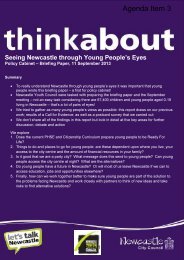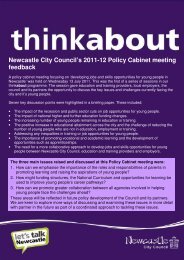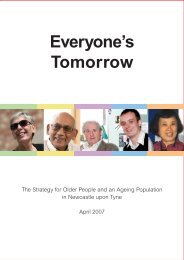NEWCASTLE'S MUSICAL HERITAGE AN INTRODUCTION By ...
NEWCASTLE'S MUSICAL HERITAGE AN INTRODUCTION By ...
NEWCASTLE'S MUSICAL HERITAGE AN INTRODUCTION By ...
You also want an ePaper? Increase the reach of your titles
YUMPU automatically turns print PDFs into web optimized ePapers that Google loves.
The last two Grand Music Festivals were held in 1824 and 1842, the first<br />
being a resounding success, musically and financially but the second only<br />
musically. The vocal contributions at all of these festivals was considered the<br />
most important aspect, purely instrumental music never commanded the same<br />
attention. It was ever thus in English music making up to the 20 th century. It still is<br />
if one considers that the most popular night of our greatest music festival today,<br />
The Promenade Concerts, is the last, when everyone is allowed to join in and<br />
sing. At the 1824 Festival, Catalani and Braham appeared once again to great<br />
acclaim although one dissenter complained that her rendition of ‘I Know that My<br />
Redeemer Liveth’ from the ‘Messiah’ was not as good as the German lady,<br />
Madame Mara. He was probably right, Catalani had returned to England in 1824,<br />
when Lord Mount-Edgcumbe exclaimed that he found ‘her powers undiminished<br />
but her taste unimproved’. Nevertheless, the total receipts amounted to £5,846,<br />
which left £769 4s for the several charities the festival committee had agreed to<br />
support. No doubt, looking back on this festival, the organisers of the 1842<br />
Music Festival considered that they could do even better and assembled an<br />
impressive list of patrons, who included The Duke and Duchess of<br />
Northumberland, Duke and Duchess of Roxburghe, the Marquis of Bute, the<br />
Marquis and Marchioness of Londonderry and a whole list of Counts, Earls and<br />
Lords. Came the day and it was admitted that the singers were not such great<br />
singers as at the previous festival but they were only ‘triflingly their inferiors’.<br />
Potential stars they may have been in their time but today they are long<br />
forgotten. Handel’s music predominated as usual but there was a wider selection<br />
of choral pieces by other composers including Beethoven, Haydn, Hummel,<br />
Mendelssohn, and Rossini. The chorus was largely drawn from local choral<br />
societies supplemented by those from Durham, Carlisle and Lincoln, and the<br />
band of sixty-four performers was, it was reported, ‘The best there has been, or<br />
has ever been heard in Newcastle’. The festival was deemed a success from the<br />
musical point of view, but ‘notwithstanding the goodly array of noble patrons and<br />
the influence and energy of the working committee, the pecuniary result was very<br />
disheartening’. Many years later, strong religious feeling was blamed for the loss<br />
as it had been regarded by many at the time of the festival as an act of sacrilege<br />
to hold a musical ‘performance’ in a place of worship, and the festival had been<br />
denounced even from the pulpit. There were other music festivals of sorts held in<br />
the town, but the days of the Grand Music Festivals, which continued to survive<br />
in other parts of the country, were dead to Newcastle.<br />
32

















